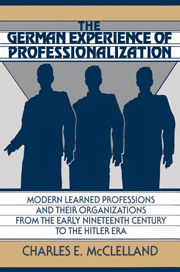 The German Experience of Professionalization
The German Experience of Professionalization Book contents
- Frontmatter
- Contents
- Acknowledgments
- Abbreviations
- Part I The problem of professions in Germany
- 1 Introduction
- 2 Problems and methods in the history of modern German professions
- Part II The transition to modern professions in the early nineteenth century
- Part III Unified professions in a unified Germany?
- Part IV Breakthroughs and breakdowns: The professions enter the era of cartels and unions
- Part V The Weimar era
- Part VI The fate of professions under and after fascism
- A word about sources
- Index
1 - Introduction
Published online by Cambridge University Press: 06 July 2010
- Frontmatter
- Contents
- Acknowledgments
- Abbreviations
- Part I The problem of professions in Germany
- 1 Introduction
- 2 Problems and methods in the history of modern German professions
- Part II The transition to modern professions in the early nineteenth century
- Part III Unified professions in a unified Germany?
- Part IV Breakthroughs and breakdowns: The professions enter the era of cartels and unions
- Part V The Weimar era
- Part VI The fate of professions under and after fascism
- A word about sources
- Index
Summary
This work is an analysis of the creation and development of modern learned professions in Germany. It includes most, but not all, occupations requiring some kind of special or higher theoretical training (as opposed to the kind of training needed for manual labor, crafts, and trades). Specifically, such professions include “old” ones as physician, lawyer, and clergyman, as well as “new” ones such as engineer, teacher, and chemist. It seeks not only to show how such training came about, but also how the recipients of that training organized themselves into modern national professional groups to attempt to influence the conditions of professional life. It also seeks to gauge the successes and failures of those attempts.
The chronological boundaries of this work were chosen for two reasons. First, German learned professions were able to take on the contours of modernity only by the beginning of the nineteenth century. Like most other occupations, the traditional professions were not free. The weakening and widespread elimination of guild privileges by the first half of the nineteenth century had their counterpart in the opening of more scope for professional autonomy at the same time, but throughout most of the preceding centuries professions had been regulated from without. The conditions allowing for the creation of specifically modern learned professions will be explored in Chapter 2.
Second, the opportunity of professionals themselves to associate, organize, and attempt to shape the conditions of their occupations was severely restricted, if not made impossible, by the conservative German governments prior to the mid-nineteenth century and by the National Socialist regime beginning in 1933.
- Type
- Chapter
- Information
- The German Experience of ProfessionalizationModern Learned Professions and their Organizations from the Early Nineteenth Century to the Hitler Era, pp. 3 - 10Publisher: Cambridge University PressPrint publication year: 1991
